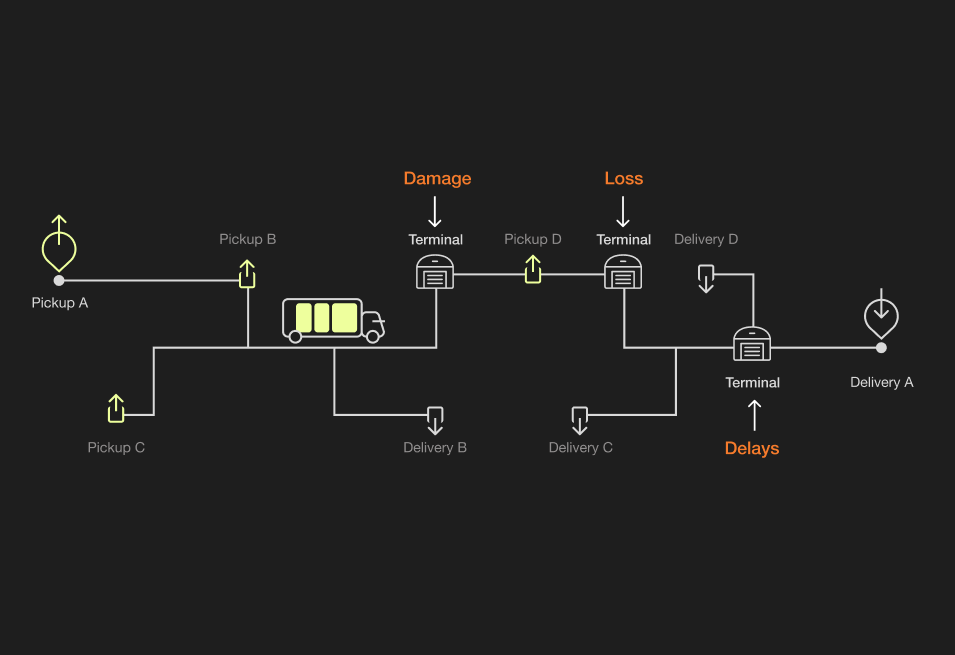10 Most Common Freight Shipping Questions

At first glance, the freight industry can be overwhelming. Even weathered professionals who have years of experience in the industry can feel flooded when new intermediaries spawn or regulations change. The reality is that when it comes to the freighting industry, the lack of standardization and monopolies creates room for the many parts of this multifaceted industry. Sure, FedEx and UPS have become the one-stop shops for customers trying to ship but what about the backend? What about the freight shippers that need to move a product or good across a state or country? This, of course, created a demand for freight brokers who are now the guides of the industry. Still, no matter if you are a novice or someone experienced in the freight industry, chances are you have questions about shipping. Perhaps even questions you would like to know the answer to before trusting a liaison. Any respectable intermediary should be able to answer these questions but it is good to be armed with the knowledge regardless. In which case, if you have shipping questions and you’re looking for answers, you came to the right place.
10 Most common freight shipping questions
The range of questions asked about the shipping industry stretches far on both ends. From backend, frontend, to simply inquiries about the process, there is no shortage of questions regarding shipping. The ones we have chosen below highlight what we think are the most important and fundamental facets of shipping.
LTL and FTL, is there a difference?
The short answer here is yes. There is certainly a difference. For those of you that see ‘LTL’ and ‘FTL’ and register it as jargon, then know that LTL is Less Than Truckload and FTL is Full Truck Load. Both of these terms refer to a method of freight shipping. By and large, they are the most popular and utilized forms of freight shipping, but it is important to note that there exists a host of alternative options. So what’s the difference between the two?
LTL explained
Less than truckload shipping refers to shipments that are usually less than 4,000 pounds and won’t take up an entire truck. In which case, a freight carrier then combines multiple shipments coming from various shippers into a single truck. Routes are optimized depending on the origin and destination of the shipment and usually, shipments that have the same target destination, or one that is adjacent to the other, are clumped together. This form of shipping is desirable because it drops the price and utilizes space, an incentive that works for both shippers and carriers. The shipment will travel through a hub and spoke type network, with multiple unloading and loading points, until finally, it’ll reach its intended destination. The biggest pro to LTL is the price point, the biggest con is the nature of the travel.
FTL explained
As you could deduce, if LTL is less than truckload, then full truckload (FTL) is when a shipper utilizes the entire storage of a truck for their shipment. This typically is chosen when shipments are over 15,000lbs and require a hefty amount of space. Carriers will offer TL options with a flat rate, being that the variables are few. Shippers that require TL shipping reap the benefits of having full control of the shipment, front to back, as the route is specifically theirs, there won’t be any offloading stops, and the transit is faster. The pro here is the speed and safety of the travel and the con is its costliness. Answer: In an oversimplification, LTL is sharing space in a truck, TL is owning every piece of cargo in it.
Freight brokers, are they necessary?
In the middle of the 20th century, as the freight industry began to evolve, an array of intermediaries and carriers poured all their efforts into monopolizing the industry. They wanted to be the only carrier and the only intermediary utilized for every shipper’s shipping needs. No such thing occurred. Instead, all of these should-be companies made room for more, and suddenly there were multiple different middlemen and moving pieces. Enter freight brokers, the liaisons of the freight industry that work to foster relationships between carriers and shippers, and ensure that the contract signed between them works to benefit both parties. Answer: Today, by the sheer complexity of the freight industry, trying to navigate the terrain on your own is a poor decision. Freight brokers or the likes of come highly recommended.
Freight classes, what are they?
There’s an association called NMFTA (National Motor Freight Traffic Association) that created the NMFC system to standardize the ‘types’ of freight in the industry. Their 18 classes range from 50-500 and each number serves as an umbrella for multiple different types of goods and commodities. These freight classes work to standardize the price of shipping a certain type of material. Shipping a hazardous chemical is going to be trickier than shipping wood pallets and the freight classification that corresponds to each of these materials is going to influence the price. Answer: freight classes are categories used to standardize pricing in the freight industry.
How are freight classes calculated?
As a shipper, it is paramount to know exactly how freight class is calculated, as assigning the wrong code to a certain cargo can accrue hefty costs in the future, or have your company paying much more than need be. Generally, freight classes are calculated by four factors; physicality, storability, ease of handling, and liability. The physicality relates to the dimensions and density of the cargo, storability to how well it keeps within a storage space, ease of handling to the difficulty required to physically handle the goods or commodity, and the liability to how risky it is to ship. By assessing these four factors, a freight classification is then assigned to the cargo based on their outcome. Answer: freight classes are calculated by a cargo’s physicality, storability, ease of handling, and liability.
What are accessorial fees?
Accessorial fees are charges that add on to the original estimate. They could be thought of as extras that arise via circumstance. For instance, you have decided to ship a bunch of engine pieces to a certain warehouse. If that warehouse doesn’t have a loading dock for the truck to pull up to and unload, you will need a truck with a liftgate to unload. This will accrue an accessorial charge. Answer: accessorial fees are the extra charges that accrue during the shipping process if an uncommon variable is to arise.
Is there a standardized contract like a statement of work?
In the freight industry, the SoW (statement of work) is a BoL (bill of lading). This legally binding contract details the shipping agreement between carrier and shipper from front to back—containing route, NMFC #, pricing, and more. Knowing the ins and outs of a BoL is imperative for shippers as you never want to be surprised due to the contract’s language. A BoL should be the receipt that sets the expectation. Answer: yes, it is called a Bill of Lading.
What is the difference between a freight broker and a freight forwarder?
The main difference between a freight broker vs freight forwarder is responsibility. A freight broker is a liaison between carrier and shipper, there to oversee communication and foster a healthy relationship between the two parties. In situations where damages may arise, the freight broker is not liable for any claims administered. A freight forwarder, on the other hand, will assume responsibility for the shipment. The BoL is usually issued in their name and they are responsible for insuring the cargo. Additionally, they often provide storage in their own facilities and operate internationally. Answer: a freight broker is like an agent where a freight forwarder is an agency.
Do shippers need freight insurance?
While freight insurance is highly recommended, there is no law that states it is a requirement for the shipper to insure their cargo. Usually, a carrier will have liability coverage that is instated to protect their trucks and their own company but offers little for the shipper’s cargo. Liability coverage is required by the government. When it comes to general liability, it is extremely hard with our current regulations and contractual language to prove fault of a carrier if there is no insurance in place. At the beginning of the 20th century, the government implemented a doctrine that allowed shippers to seek justice against carriers but, due to how it was written, in today’s day and age the law favors carriers. Answer: While it is not legally required for a shipper to insure their freight, it is highly recommended.
How long does freight shipping take?
While this question should not arise as much as it does, it is certainly one of the most common freight shipping questions asked. Of all the freight questions we have detailed here, this is the most subjective. It is difficult for any carrier or intermediary to provide an accurate estimate of how long a certain type of shipping takes. This, of course, is dependent on the origin and destination, type of shipping (remember LTL is going to be a lot slower than FTL), whether or not it’s domestic or international, if it has a rigorous customs or unloading process, and so forth. While a carrier is going to be able to say ‘we can usually make it from California to New York in x amount of time,’ time spent in the supply chain is always going to be specific to a certain shipper’s needs and type of cargo. The lack of standardization within the industry can make this a difficult question to answer without addressing the specifics. Answer: this depends on the details of the shipment.
Who processes claims?
The claim process of the freight industry is one that is extremely important to understand. The reality here is that, due to the nature of shipping, problems can occur. From sheer coincidence to poor handling, damages, losses, and theft are not unrealistic risks. Thus, if you have insurance (either freight insurance or your carrier’s liability coverage) then you are going to want to know how to process a claim.If you have a freight broker or freight forwarder, it should be their responsibility to handle the claim should something go wrong with the shipment. They will know the communication process better than a shipper, ensuring that the claim filed is going to be filed correctly. The difference is a broker will handle the communication but a forwarder should be responsible for the claim itself. If a company does not have a liaison or middleman, then it is up to them to file the claim to either theirs or their carrier’s coverage provider. For freight insurance, if damage is noted on the proof of delivery, the claim can be filed up to 9 months from the date the incident occurred. If damage is not noted on the proof of delivery, the claim must be filed within five days. For liability coverage, the claim can be filed up to 9 months from the date of the event.Answer: a shipper’s liaison should handle the claim process from front to back.
Conclusion
The multilayered freight industry is not for the faint of heart. From the multiple moving pieces, intermediaries, to the lack of standardization, navigating the shipping terrain can feel like running through a maze. However, the more you know about these freight shipping questions, the closer you come to grasping the intricate texture of the industry.





